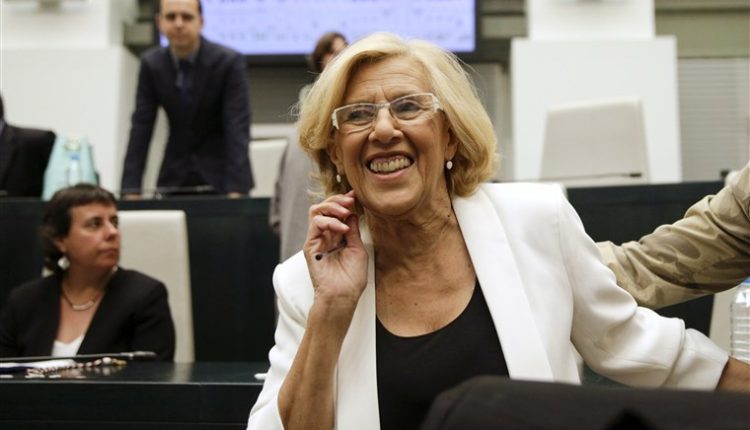 Marcela Carmena
Marcela Carmena
In praise of women in politics: Carmena, Pelosi, et al.
Marcela Carmena, 75, is a grandmother and one of the most powerful political leaders in Spain. Carmena, the mayor of Madrid, is favored to win a second term in the upcoming election. When Carmena, a former communist and still clearly to the left, won the first time in 2015, she delivered the powerful conservative party, and the political establishment in general, a shock. Four years later and given her track record and down-to-earth style, she could repeat. The result will depend on political alliances.
Carmena’s most impressive accomplishment, one that any big city mayor in the world would envy, was reducing the city’s debt by almost half. Before Carmena was elected, conservatives predicted she would spend the city deeper into debt. Instead, during her tenure, Madrid’s debt went from 4.8 billion Euros in 2015, to 2.7 billion Euros in 2018.
Carmena reduced the debt drastically without taking the axe to public services or giving developers and others in the business sector a blank check. Instead, as the New York Times reported on May 25, she did it mainly by “bringing a refreshingly frugal management style to a city administration accustomed to feeding at the public trough.”
The Times story, by Rafael Minder, focuses sharply on Carmena’s personal and political style. On this, the piece quotes Javier del Soto, a Spanish radio talk show host: “I can’t imagine many big cities where the mayor goes to the market to buy food with her own money, takes the bus with her grocery bag and then cooks in a kitchen above her office…She has a clean and caring image that makes it hard to imagine anything corrupt happening under her watch—unlike what was going on in Madrid before her.”
Carmena has taken heat from the right for, among other things, changing the names of some city streets to remove those of people associated with the Franco dictatorship. Conservatives have also attacked her for not attending the traditional religious processions. Carmena, perhaps partly in response, visited Pope Francis at the Vatican to talk about immigration and global warming. The two have similar views on these issues and share a rejection of pomp and ceremony.
Others took exception when Carmena put on hold a big development project. But the city obtained modifications from the developer and the luxury housing and commercial project will soon open. Another bone of contention has been Carmena’s ban on polluting vehicles from downtown streets. When a German correspondent complained about traffic problems, a smiling Carmena said: “Please take the bus.”
Marcela Carmena and Nancy Pelosi, 79, the Speaker of the House of Representatives and the most powerful person in the U.S. Congress, have a lot in common. Both are well into their seventies. Both are, in the political context of their respective countries, pragmatic progressives. Neither fits the stereotype of a wild-eyed radical.
Pelosi has been jousting with President Donald Trump all year. Pelosi has won each encounter, which has frustrated the president. Trump and his allies have lashed out against the Speaker in especially vicious ways (even for this bunch of dirty tricksters), including a video altered to cast the false impression that Pelosi was drunk or, more likely, that she is senile. Pelosi has not blinked and neither has she let herself be drawn into Trump’s game of insults, more vicious than the Game of Thrones.
Not all women leaders in politics are older. After the massacre at a mosque in the small city of Christchurch perpetrated by a white supremacist, New Zealand’s young Prime Minister Jacinda Ahern showed how a leader reacts to such outrages. She immediately reached out to the Muslim community and quickly moved to ban semi-automatic guns, in sharp contrast to Donald Trump’s response after a white supremacist xenophobe murdered eleven people at a Pittsburgh synagogue, which was to blame the victims for not having armed security guards at the Temple. In the United States, women of all ages like Kamala Harris, Elizabeth Warren, and Alexandria Ocasio-Cortez, have infused U.S. progressive politics with a new dynamism.
Not every woman in politics is progressive. Nor have all been as successful as Carmena or Pelosi. And some have not become wiser with age. The Conservative Party Prime Minister of the United Kingdom, Theresa May, took on a bad situation and made it worse.
Britain leaving the European Union (Brexit) was always a bad idea, but as in the United States with Donald Trump, enough voters were xenophobic enough to vote for Brexit and it won. But May was unable to convince even the members of her own Tory Party in parliament to go along with any of several plans she proposed. She had no greater success in getting the European Union to agree to let the Brits exit Europe on their terms. Last week May finally admitted defeat, resigned as party leader, and promised to exit 10 Downing Street in June. She will leave behind a royal mess.
Are women in politics going to save the world? If you remember Margaret Thatcher, among others, you know it’s not that simple. Thatcher and Ronald Reagan led the way toward the savage form of capitalism that today rules the world.
On balance, however, research and experience suggest more women in politics is a good thing, not only for the sake of fairness but also outcomes. Women, unlike hardcore macho men like Donald Trump, don’t see life in black and white or as a battle for dominance to be waged to the death regardless of collateral damage.
The take-no-prisoners-macho attitude is especially dangerous at a time when an impulse decision by a political leader in control of nukes could end human life on earth. The surge of women in politics then, who generally bring a more temperate outlook, should not just be welcomed but celebrated.

